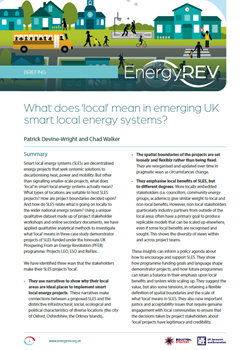Patrick Devine-Wright and Chad Walker
15 February 2022
Smart local energy systems (SLES) are decentralised energy projects that seek systemic solutions to decarbonising heat, power and mobility. But other than signalling smaller-scale projects, what does ‘local’ in smart local energy systems actually mean? What types of locations are suitable to host SLES projects? How are project boundaries decided upon? And how do SLES relate what is going on locally to the wider national energy system?
We have applied qualitative analytical methods to investigate what ‘local’ means in three case study demonstrator projects of SLES funded under the Innovate UK Prospering From an Energy Revolution (PFER) programme: Projects LEO, ESO and ReFlex. We have identified three ways that the stakeholders make their SLES projects ‘local’: (i) using narratives to show why their local areas are ideal places to implement smart local energy projects; (ii) setting flexible boundaries that are updated over time as circumstances change; and (iii) by emphasising the local benefits of SLES, but to different degrees depending on which stakeholder is involved.
The insights can inform a policy agenda about how to encourage and support SLES. They show how programme funding goals and language shape demonstrator projects, and how future programmes can retain a balance in their emphasis upon local benefits and system wide scaling up. They suggest the value, but also some tensions, in retaining a flexible definition of spatial boundaries and the scale of what ‘local’ means in SLES. They also raise important justice and acceptability issues that require genuine engagement with local communities to ensure that the decisions taken by project stakeholders about ‘local’ projects have legitimacy and credibility.
